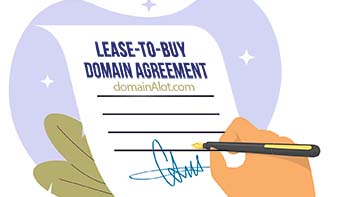Where To Buy Expired Domains?
For The Right Buyer, An Expired Domain Represents A Golden Opportunity In The Internet Economy

When people first hear the phrase "expired domain," it can sound like something past its use, or something unwanted and of little to no value, like an old carton of milk that's no good anymore. In reality, however, expired domains are one of the liveliest corners of the internet economy. Every day, thousands of names slip from the hands of one owner and become available to the next, and for those who know where to look and what to buy, that's where the opportunities lie.
Some buyers are chasing a quick flip, hoping to grab something cheap and resell it fast. Others are more patient, building portfolios they expect to appreciate over time. Whichever camp you fall into, the big question is always the same: where do you actually buy expired domains, and how do you know if you're getting value?
How Domains Expire?
Before you begin emptying that PayPal account or swiping plastic and buying up as many domains as you can handle, the first thing to understand is what "expired" actually means.
A domain expires when its owner simply doesn't renew it. Sometimes it's neglect, sometimes it's budget, and sometimes the project tied to the domain just didn't work out. Hey, we can't all be successful billionaires... After a grace period, the domain registrar releases it, often sending it into an auction before it fully drops. That's why you'll often see certain names with years of history suddenly up for grabs.
Should I Even Care About Expired Domains?
In short, yes. Absolutely. Most definitely. In fact, if you are on the hunt for a new domain name, an expired domain should probably be your first port of call.
The attraction of an expired domain is that can come with many built-in advantages:
- Backlinks from reputable sites
- Traffic
- Search engine history
- Be shorter in length than anything possible to register new
- Consist of a brandable word that isn't available in a coveted .TLD anymore
In fact, compared to a brand new registration, an expired name often has something more. It has a story, a footprint, and in many cases, real market value.
Auctions
So, where do people actually get them?
Most buyers start with the major auction houses. GoDaddy Auctions is probably the biggest, simply because of GoDaddy's market share as a registrar. NameJet is another heavyweight, often hosting exclusive auctions from registrars like Network Solutions and Register.com. It's a good place for investors who don't mind going head-to-head with seasoned pros. Then there's DropCatch, which specialises in catching domains the instant they drop. It's fierce, technical, and not for the faint of heart, tending to attract buyers looking for SEO-heavy names with backlink authority.
Copies Aren't Fake But They're Not The Original
The idea of grabbing a bargain is probably what attracts people most to an auction, and the volumes of domains listed at the sites mentioned are enormous. You'll find everything from forgotten personal blogs to strong keyword .coms with dozens of bidders fighting over them. And that's the rub. The upside is choice, but the downside is competition, and competition means one thing: money.
The reality is that the vast majority of expired domains sold through an auction often go for far more than they're really worth. Why? Because like everything that is in short supply, it creates demand. There might be millions of domains available at an auction, but each domain is unique. For example, there are over 150 versions of ArtColony. From ArtColony.net to ArtColony.online, but there is still only one ArtColony.com, and that exclusivity, which is extremely valuable for some domains, can be misinterpreted and highly misleading for others.
Imagine an auction on eBay. A seller might have listed an item far below the asking price of other sellers who are selling the same thing, but does so knowingly, for one reason: to attract interest. When five, ten, or a hundred interested buyers start bidding, the "just a little more" mentality takes over, and a bidder believes that if they increase their bid just a fraction then they'll surely "win" the item. Problem is, everyone else is thinking that too, which drives the price up and soon the need to win takes over from logic altogether.
Bidding Wars
Of course, there's another problem with auctions, because we have to remember who the domain owner is bidding against? And that would be other prospective domain owners. But are these the people who will determine a domain's value? You might think so, but in actual fact, the answer is no. The "market" is based upon many factors and trends, and just because several parties saw interest in a domain and decided to bid, inflating its price, doesn't mean that the domain is actually worth what was paid, and when you combine other determining variables such as the "value" of the domain extension, i.e. a .com versus a .shop, then it's easy to see how so many domain owners make the fatal mistake of believing they now own a piece of "Premium" digital real estate.
Marketplaces
Beyond auctions, there are marketplaces like Sedo and Afternic where expired domains and previously-owned names are listed for retail-style sales. These tend to have higher sticker prices, but also more curated options and instant buy-it-now convenience. Dynadot and a few other registrars also run their own auction platforms, each with their quirks, not to mention commission fees, so it's definitely worth doing the rounds before committing to a platform if you feel that auctions are for you.
Before The Hammer Falls
That's the landscape, but the real question is how do you fit into it?
If your plan is "flipping", a term coined for buying a domain with the pure intention of selling it quickly at a profit, then the appeal is obvious. Grab a domain for $50, sell it for $300, and mange to do it a few times a month, then you'll probably feel like you're printing money. The reality, though, is that it's not that easy anymore. In truth, that time has long since passed.
The golden era of picking up cheap expired .coms and flipping them overnight has faded as more people have learned the game. That doesn't mean it's impossible, but it does mean that if you're going to do it, and more importantly, be successful at it, then you need to accept that it will take more strategy than ever. You'll need a keen eye for what's trending, for what buyers will actually pay for today, not six months from now, and you'll need to stay sharp and vigilant, especially when an auction tries to suck you in to paying that little bit more.
Today, domains are brands and names tied to new technologies, cultural shifts, or very short, memorable words can still move quickly if you list them right away on marketplaces like Afternic or Sedo. Something like PayMy.Rent is a good example of this.
As a brand it's functional, memorable, and speaks directly to a use case that exists right now. As a domain name, it's perfect for a buyer in the fintech or rental payment space, not only because it saves them the trouble of trying to invent something else, but because in all likelihood, whatever alternative they could find would be less relevant and therefore worse.
A Tortoise Or A Hare?
For those who take the long view, expired domains are less about the quick sale and more about steady portfolio growth. Here the focus isn't on flipping next week but holding for a few years until the right buyer shows up.
In this situation, you’re looking for names with real branding potential, industry relevance, or cultural staying power. You have to, because you'll be paying renewal fees for the domain to keep it registered until the right buyer comes along.
BioSpln.com is a great example of a domain that's not a quick flip by any means, but it offers the owner a very strong hold. Why? Well, biotech companies are pouring billions into the space, and a clean, brandable name like that can easily become the identity of a serious startup. Especially one involved in genetics and clinical research.
NeoRule.com is another great example and falls into the same camp. It's short, modern, and highly flexible. The owner might not sell it overnight, but when the right AI or fintech project comes looking, the value will be obvious.
The advantage of investing in domains rather than simply flipping them is that you're in no rush. The risk is that your money is tied up in names for longer, but the upside is the return can justify the means and then some.
Needles and Haystacks
Whether you decide you're flipping or investing, the constant is this: find value.
It might seem obvious, but it's rarely easy.
The auctions and marketplaces are packed full of names. There are literally tens of millions of domain names available, but the trouble is, that the overwhelming majority of them aren't worth your money.
To separate the wheat from the chaff, you need to know what to look for. Firstly, a clean backlink profile is a must-check. If the domain was used for spam or shady SEO tricks then stay clear. Archive.org can show you what the site used to be, and search engines can tell you whether it still ranks for anything. So, don't be lazy, or presumptuous for that matter. Check any domain that takes your interest. Check it again to be sure, and when you're done checking, check it once more.
Beyond history, think about the name itself. Short, memorable words are always safer bets. As an example, it's far easier for a user to type 123XLSX.com, rather than 123MicrosoftExcelSpreadsheets.com. Yes, you might argue that a user of Microsoft Excel knows how to spell Excel Spreadsheets, but if they work with them, then they also know that they are saved in the .xlsx format and that's a lot easier to type, and therefore not misspell, than the alternative.
Keywords that still have commercial demand can work too, but avoid fads that already feel stale. Foraging.world is an interesting case. It's niche, but the foraging trend is real, and the .world extension fits the theme. It's not a mass-market flip, but it's the kind of name that will appeal to a community, a brand, or a publisher in the space. As a real and valid alternative to Foraging.com, Foraging.world holds valuable relevance, much more than say Foraging.net or Foraging.org otherwise would.
The use of keywords not only in the domain name, but the actual extension itself can also be highly relevant. CareerCoach.help is instantly descriptive, points to an obvious market, and is a strong fit thanks to the .help extension. Those are the qualities that make expired domains more than just words, it transforms them into assets.
The Skill Of The Game
We've talked about the allure of a domain auction, as well as the dangers, and these exist primarily because an auction can quickly become an emotional trap.
It's easy to get caught in the moment, bidding $200 on something you told yourself should be capped at $75 beforehand. So remember, discipline is everything. It really is.
Always set a maximum bid and stick to it. If you lose, let it go, it's ok, another good name will come around. Patience is the underrated skill in this game. Smart buyers research thoroughly before they bid. Look at traffic data, check for penalties, study comparable sales. Even practical details matter, like when the auction ends. If you're bidding on a name that closes at 3 a.m. your time, are you really going to stay awake to fight for it? Sometimes letting the automated system handle it with your maximum bid is better than chasing sleep-deprived impulses. Watchlists, backorders, and alerts can help you stay organised, so use them, and stick to them. Don't deviate from the system that works for you.
Go Gently
So, here comes the statement: Personally, and as I've tried to argue, I don't believe that domain flipping is a viable career in today's market.
I'm certain that there are hundreds, if not thousands of domain owners who will disagree with my opinion, and rightly so, after all there is no be all and end all here. But by career, I mean the ability of flipping domains both quickly and consistently enough to afford you a constant stream of income that will, in addition to covering your daily and households bills, also create enough liquidity to further acquisitions and cover costs. That business model is challenging, even for the best of us. Now, with that said, if you're still set on flipping, the best advice I can give is to start small. Don't drop thousands on your first week hoping for a quick return. It won't happen. Bankruptcy, on the other hand, most likely will.
Test the waters, learn what sells, list your acquisitions quickly on platforms with distribution networks like Afternic, and price to move. But remember, Afternic (which is owned by GoDaddy), is no different to the other large distribution networks, and you pay a hefty price for their use. In the case of Afternic, it can be anything up to 35% of the sale. That's a lot of money when your business depends on flipping quickly at low rates and high volume, and because quick flips often work better when your asking price feels like a deal, it's hard to achieve that when you already need to add such a large margin straight off the bat just to cover the cost of commission.
For investors, the mindset is different. You're curating a portfolio, and it pays to think in themes. AI, green living, health, and fintech are all massive growth areas. Brandables with flexible use cases also tend to hold value. Don't ignore non .com extensions when they fit the context as shown; .help, .world, or even creative new gTLDs can make sense if they align with the niche. The key is to avoid overpaying. Always. Your worst mistake isn't missing out on a name, it’s overextending on one that doesn't pan out.
Treasure To Hunt
When all is said and done, buying expired domains is exciting because it mixes chance, strategy, and vision.
There are those who say it's all about luck, but there are games like black jack and lottery draws for such things. Then there are those who say that it's all about timing and the unpredictability of markets, but markets are there to by analysed. And let's not forget those who say that an expired domain expired for a reason, that no one saw the value in it, but as the expression goes, beauty is in the eye of the holder, and not all that we see is the same.
The fact is, you might stumble into something brilliant that everyone else overlooked. More often than not, you'll sift through thousands of mediocre names to find a single gem worth holding. That's part of the process. The important thing is to stay realistic. You won't flip every purchase into a payday, and you won't build a seven-figure portfolio overnight. But if you approach it with patience, discipline, and a clear eye for value, expired domains can be one of the most rewarding investments on the web.
The goal isn't just about finding cheap names, it's about finding the right names. Those with success in this industry are those that somehow manage to find domains with both.
Over time, with failures, and successes, you'll learn more of how to find expired domains, and what you're willing to pay for them. That's what separates a hobby from a business, and that's what will keep your portfolio growing while others burn out chasing the illusion of easy money.




